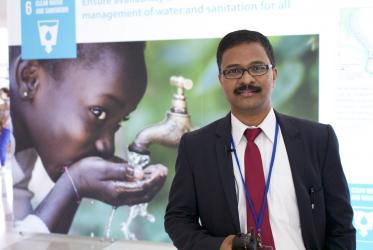Affichage de 1 - 20 de 54
Christ’s Love (Re)moves Borders – GETI 2022 in images
13 Septembre 2022
Un colloque œcuménique de réflexion théologique sur l’écologie
18 Février 2021
Churches should use their voice on climate change
26 Février 2020
WCC helps local French community say “no” to bottled water
11 Juillet 2019
WCC expresses sadness, solidarity after Notre Dame fire
16 Avril 2019
Mission is the essence of Christian life, says Orthodox theologian
15 Novembre 2018
Churches in France encourage ecological conversion
24 Janvier 2018
A cycling pilgrimage of justice and peace
07 Août 2017
G7 must address famine
22 Mai 2017
Le G7 doit lutter contre la famine
22 Mai 2017









